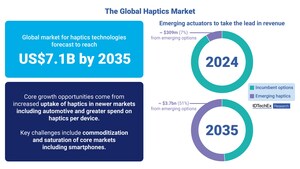BOSTON, May 9, 2018 /PRNewswire/ -- As advancements in connectivity and miniaturization of electronics are made, smart sensors are beginning to find traction within the wound care pathway. IDTechEx Research has published a report titled Advanced Wound Care Technologies 2018–2028 and have previously reported on why disruption is needed in wound care in the next 10 years. Here, IDTechEx explores a few connected devices that can contribute to the prevention of chronic wounds of pressure ulcers (PUs) and diabetic foot ulcers (DFUs).
Sensors for the Prevention of Pressure Ulcers
MedicusTek have created the Sensable Care system which relies on a connected sensor pad or sensor mattress for detection of patient positioning to prevent pressure ulcer formation. By tracking patient position over time, the Sensable Care system can determine which areas of the patient are being exposed to prolonged pressure and notify caregivers accordingly for repositioning. The system resets if the patient successfully repositions themselves, thus decreasing the burden on caregivers where possible. Moreover, caregivers can receive immediate feedback as to whether their repositioning efforts were adequate in reliving the excessive pressure.
Leaf Healthcare have taken a different approach to providing a similar solution. Their product, the Leaf Sensor, is a single-use wireless patch to be worn on the patient's chest. Sensors within this device remotely monitor the patient's position, orientation and status. The Leaf Sensor aims to provide a more effective way to prevent PUs by accurately measuring the turn frequency, angle, and reperfusion time. A history of the patient's movements can help the caregiver in ensuring an even distribution of pressure over time. Moreover, the tracking of ambulation helps caregivers determine how the patient is progressing towards their mobility goals.
Sensors for the Prevention of Diabetic Foot Ulcers
Smart socks and insoles have been developed for the prevention of DFUs. Using these devices, diabetics can take a more active role in the care of their feet, whether by modifying their behavior, or by the early detection of injuries.
Orpyx have developed the SurroSense Rx shoe insert consisting of a textile pressure sensor. Real-time monitoring of pressure levels allows for wearers to modify their walking behavior to avoid damage to their feet. This is particularly useful to those who have decreased sensation due to peripheral neuropathy.
Siren's smart socks have integrated sensors to monitor temperature changes throughout the day to detect early signs of injury. This is because inflammation, one of the early signs of injury, is accompanied by a rise in skin temperature.
Bonbouton's smart insoles also monitors the temperature changes. Their product detects temperature differences between the wearer's feet – a large temperature difference detected between the feet signals decreased blood flow in the foot with the higher temperature. This is cause for concern, as ischemia is another cause of DFUs.
Footfalls & Heartbeats are working closely with the University of Nottingham to develop smart socks that measure both pressure and blood flow in the feet via optical sensors embedded in the socks.
The prevention of PUs and DFUs using the above technologies has the potential to save patients years of poor health and the healthcare systems billions of dollars per year. The majority of PUs are entirely preventable, and these technologies should help immensely with current efforts to decrease PU incidence. Additionally, the prevention of DFUs can have significant knock-on effects, such as the prevention of lower-limb amputations – over 85% of nontraumatic lower-limb amputations are preceded by a DFU.
To learn more about wound care technologies, please refer to the IDTechEx Research report Advanced Wound Care Technologies 2018–2028. For those who want to learn more about how connected sensors are being used in the broader healthcare space, IDTechEx have also published a report titled Digital Health 2018: Trends, Opportunities and Outlook. The report is of particular relevance to advanced wound care, as it features an in-depth look at the use of digital health in managing chronic conditions, and includes a chapter dedicated to diabetes management.
Contact
Charlotte Martin
Marketing & Research Co-ordinator
[email protected]
SOURCE IDTechEx
WANT YOUR COMPANY'S NEWS FEATURED ON PRNEWSWIRE.COM?
Newsrooms &
Influencers
Digital Media
Outlets
Journalists
Opted In






Share this article